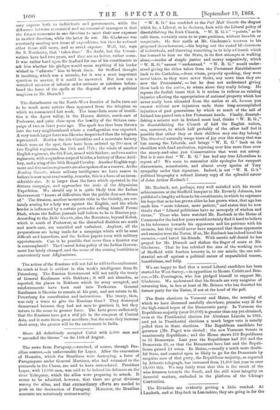The news from Paraguay,—received, of course, through Bra- zilian sources,—is
unfavourable for Lopez. After the evacuation of Ilumaita, which the Brazilians were destroying, a force of Paraguayans under General Martinez, who had retreated to the peninsula in the Chaco, are said to have surrendered. President Lopez, with 12,000 men, was said to be behind his defences on the river Tebiquary, which the allies were preparing to attack. It seems to be admitted, however, that there are great divisions among the allies, and that extraordinary efforts are needed to push on the destruction of Paraguay. Moreover, the Brazilian accounts are notoriously untrustworthy. "W. R. G." has confided to the Pall Mall Gazette the disgust which he, a Liberal, as he declares, feels with the Liberal policy of disestablishing the Irish Church. " W. R. G.'s" "points," as he calls them, certainly seem to us pure positions, without breadth or magnitude. He first cavils at Mr. Gladstone's reserves in his proposed disendowinent, —his buying out the vested lif.!-interests of individuals, and throwing something in to help a Church which has learned to lean on the State, in its first attempts at walking alone,—modes of simple justice and mercy respectively, which "W. R. G." cannot "understand." "W. R. G." would under- stand giving the tithes taken from the Protestant Establishment back to the Catholics,—from whom, properly speaking, they were never taken, as they were never theirs, any more than they are now the Protestants', — but he does not understand giving them back to the nation, to whom alone they really belong. He repeats the foolish taunt that it is useless to redress an existing injustice affecting the appropriation of national property which has never really been alienated from the nation at all, because you cannot without new injustices undo those long-accomplished injustices of past generations by which so much of the soil of Ireland has passed into a few Protestant hands. Finally, disestab- lishing a minute sect in Ireland must lead, thinks "\V. R. G.," to disestablishing the Church of half the English nation, one, moreover, to which half probably of the other half feel it possible that either they or their children may one day belong ! The Standard naturally weeps tears of joy over this sheep that was lost among the Liberals, and brings "W. R. G." back on its shoulders with fond exultation, rejoicing over him more than over the ninety-and-nine just Conservatives that went not astray. But is it sure that "W. R. G." has had any true Liberalism to repent of ? We seem to remember able apologies for rampant slaveowners, secessionists, and almost every species of Tory sympathy under that signature. Indeed, is not "W. R. G.'s " political biography a refined literary copy of the splendid career of John Arthur Roebuck ?






























 Previous page
Previous page